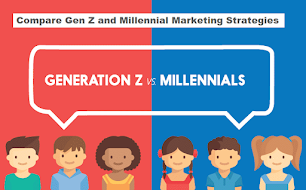As the consumer landscape continues to evolve, understanding the distinct preferences and behaviors of different generations is crucial for marketers aiming to craft effective strategies. Among the most influential demographic cohorts in today's market are Generation Z (Gen Z) and Millennials. Born into different cultural and technological contexts, these generations exhibit unique characteristics that shape their interactions with brands and consumption habits.
While both groups are digitally savvy and share some similarities, they also exhibit unique characteristics and behaviors that necessitate tailored marketing approaches. Gen Z, born into a hyper-connected world, brings with them a penchant for authenticity and a thirst for innovation. On the other hand, Millennials, often considered the pioneers of digital communication, value experiences and social responsibility.
Marketing strategies targeting Gen Z (born roughly between 1997 and 2012) and Millennials (born roughly between 1981 and 1996) often differ due to variations in preferences, values, and behaviors. In this analysis, we delve into the marketing strategies tailored to each cohort, highlighting key differences and similarities. By exploring the nuanced approaches required to engage Gen Z and Millennials, marketers can better navigate the ever-changing landscape of consumer preferences and effectively capture the attention of these diverse audiences.
Comparison of Gen Z and Millennial Marketing Strategies
Here's a comparative analysis of marketing strategies targeting Millennials and Generation Z:
1) Digital Preferences:
- Gen Z: They are digital natives, having grown up with smartphones and social media. Marketing to them often involves leveraging platforms like Instagram, TikTok, and Snapchat, using short-form videos and interactive content.
- Millennials: While also digitally proficient, Millennials may prefer platforms like Facebook, YouTube, and Twitter. They appreciate informative content and are more likely to engage with longer-form videos or blog posts.
2) Authenticity:
- Gen Z: Authenticity is paramount for Gen Z. They value transparency and honesty from brands. Marketing campaigns should focus on real experiences, diverse representation, and genuine connections.
- Millennials: Authenticity is also important for Millennials, but they may be more forgiving of polished marketing campaigns. They respond well to brands that align with their values and demonstrate social responsibility.
3) Personalization:
- Gen Z: Personalized marketing is key for Gen Z. They expect brands to understand their individual preferences and tailor offerings accordingly. Personalized recommendations, customized products, and targeted ads perform well.
- Millennials: Millennials also appreciate personalization but may be more concerned about privacy. They respond positively to personalized emails, recommendations based on past purchases, and loyalty programs.
4) Cause Marketing:
- Gen Z: Socially conscious causes resonate strongly with Gen Z. They prefer brands that take a stand on issues such as environmental sustainability, social justice, and diversity. Marketing campaigns should highlight a brand's commitment to these causes.
- Millennials: Millennials also appreciate cause marketing but may scrutinize a brand's authenticity. They are more likely to support brands that have a long-term commitment to social and environmental issues rather than those jumping on temporary trends.
5) Mobile Optimization:
- Gen Z: Mobile optimization is essential when targeting Gen Z, as they heavily rely on smartphones for browsing and shopping. Marketing strategies should prioritize mobile-friendly websites, apps, and responsive design.
- Millennials: While Millennials also use smartphones extensively, they may switch between devices more frequently. Marketing campaigns should ensure a seamless experience across desktop, mobile, and other platforms.
6) User-Generated Content:
- Gen Z: User-generated content (UGC) resonates well with Gen Z, as they trust recommendations from peers and influencers. Brands can encourage user participation through challenges, contests, and hashtags.
- Millennials: Millennials also appreciate UGC but may be more discerning about its authenticity. They respond well to reviews, testimonials, and content created by real customers.
7) Attention Span:
- Gen Z: Have shorter attention spans, preferring bite-sized content that quickly captures their interest.
- Millennials: Have slightly longer attention spans, engaging with more detailed content like blog posts and longer videos.
8) Brand Loyalty:
- Gen Z: Less brand loyal, easily swayed by new trends and experiences.
- Millennials: Can be loyal to brands that align with their values and consistently provide positive experiences.
9) Visual Content:
- Gen Z: Respond well to visually stimulating content like videos, memes, and interactive graphics.
- Millennials: Also engage with visual content but may appreciate a mix of visual and written content.
10) Feedback and Interaction:
- Gen Z: Desire active involvement, preferring brands that listen to their feedback and engage in two-way communication.
- Millennials: Also appreciate interaction but may be more passive in seeking it out, responding well to brands that proactively engage with them.
Overall, while there may be some overlap in marketing strategies targeting Gen Z and Millennials, understanding their distinct preferences and values is crucial for developing effective campaigns.
